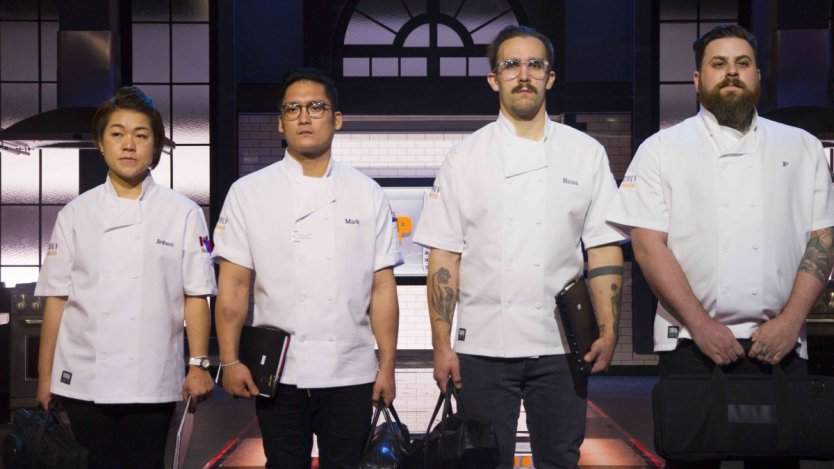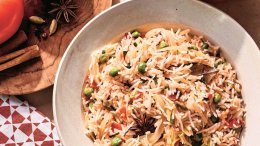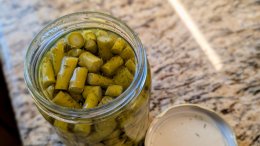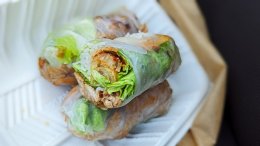Let’s just take a minute to appreciate that this is our last time seeing the Monogram kitchen for a Quickfire of Top Chef Canada Season 6. The four remaining chefs—Jinhee Lee from Calgary, JP Miron from Montreal, Mark Singson from Vancouver and Ross Larkin from St. John’s, Newfoundland—are ready to battle it out in the finale.
There have been some twists and turns along the road to get these four finalists, including some immunity voodoo, an early departure from a frontrunner, and a last-minute resignation; but Eden clears the air by telling the chefs that each of them are there because they deserve it.
The first challenge of the day is all about redemption because, as chef Mark McEwan says, any chef can have a bad day. Each chef has to recreate a dish that put them on the bottom. JP has to go back to the egg farm and he chooses to make the exact chicken and egg dish that put him there. Jinhee, who hasn’t seen the bottom too often, is given coconut and frozen foie gras from the trend mashup Quickfire. Mark only failed at one Elimination challenge and so he has to redo Turkish pizza.
Ross was on the bottom three times: for a meek Mexican scallop, his overly salty cod sound and pil-pil sauce and an underwhelming Atlantic lobster bisque. The judges (or producers?) choose to assign him Atlantic lobster. A quick recap: Ross is from Newfoundland, so far this season, he has only cooked with East Coast products. The judges then give him one of the most iconic Maritime food and ask him to make a good dish.
I’m not saying it’s a conspiracy, but it feels unfair to the other competitors who are cooking outside of their comfort zone and have Ross handed something that should be easy for him.
And guess what? His bisque hits all the marks that he missed the first time around.
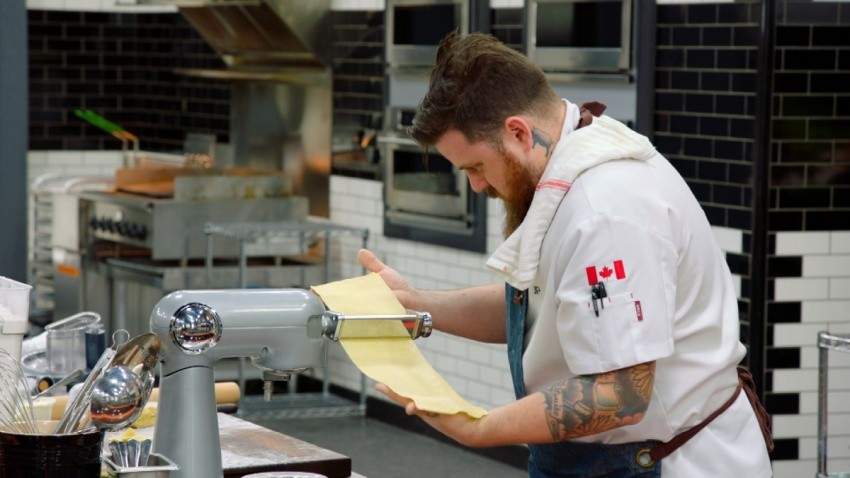
JP tries to make his ravioli in a brodo sauce better with a thinner pasta noodle and a richer sauce. It is better than the first time but not good enough to move on.
Jinhee and Mark choose to take their dishes and reimagine them in totally new ways. Mark avoids any kerfuffle with his pizza dough and his version of Turkish pizza is made of pieces of lamb with a pizza dough emulsion. It has the flavour, if not the structure of pizza.
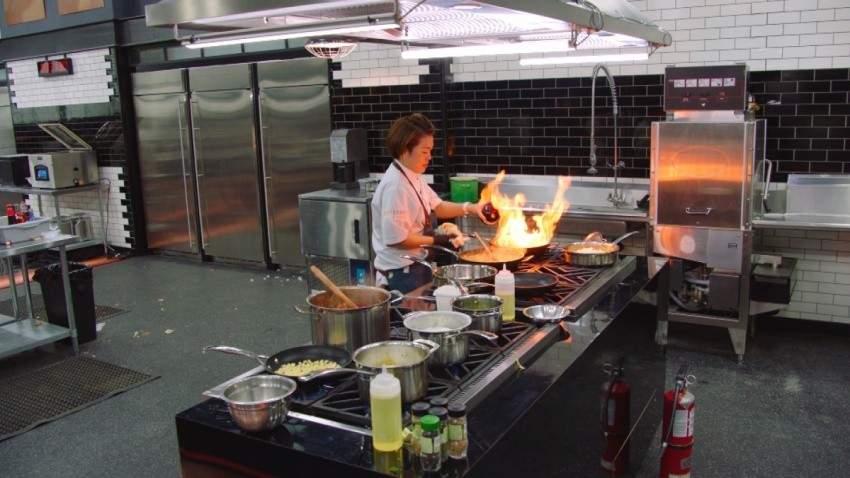
Instead of making a dessert, Jinhee makes seared duck breast with a coconut curry sauce and frozen foie gras. The foie melts into the sauce as the judges eat it, they love the dish, though the curry is reminiscent of another dish that Jinhee has made.
It is unclear to me at this point which two people are going to move forward, but Mark has the best dish of the day and then Ross is second. Jinhee and JP are told to pack their knives and go. JP tells the camera that he is going to work on the same dish until it is perfect. Jinhee says that she has learned a lot on the show and has loved the experience.
While I liked JP, I have grown to love Jinhee on this show. Her food is exactly the kind of food I want to eat; it is playful, flavourful and unexpected. Also, in a show filled with “bros” she was refreshing and vulnerable. I’m sorry she is not cooking in the finale.
It’s an East Coast versus West Coast Top Chef Canada finale with two wildly different chefs. The chefs are tasked with making the “most important meal of their lives”. But first, they are going to get some help.
Usually, the helpers are some of the ousted chefs; but this year, they bring in the big knives. Vancouver’s Matthew Stowe, winner of Top Chef Canada Season 3 is going to be Mark’s sous chef.
Ross’s help is none other than Jeremy Charles, the owner and executive chef of Raymonds, the restaurant where Ross works.
I cannot be alone in my aggravation at this point.
Ross cooks with Jeremy Charles every day. The man is his mentor and is also considered by many to be the best chef in Canada. Again, I’m not saying it’s a conspiracy, but it is starting to feel like Ross was given some advantages in this episode. I am going to give the producers the benefit of the doubt and assume that it was just how things played out.
As the sole caterer in the competition, Mark doesn’t have a boss or partner to bring in, and a Top Chef Canada winner is nothing to scoff at; but Ross and Jeremy have a working relationship in a kitchen that creates the kind of dishes that are very similar to what Ross has been cooking this whole season. Not only that, but Jeremy brought a whole roster of Newfoundland ingredients that can’t be found anywhere else.
Mark, however, has to explain his concepts to Matthew Stowe and they have to find their rhythm in a very short time. There may be good explanations as to why the producers chose to do this (perhaps Jinhee’s boss was waiting in the wings in case she won), but they did not take into consideration how this looks to the viewer. (I think it looks bad, you may disagree.)
Both chefs are making a menu that reflects them personally. Mark wants to show his progression as a Filipino-Canadian, from a child who didn’t know his mother until he was eight years old to now. His first dish is a Kushi oyster from the West Coast with smoked crème fraiche and dill oil that reminds him of the smoked oysters he ate as a kid.
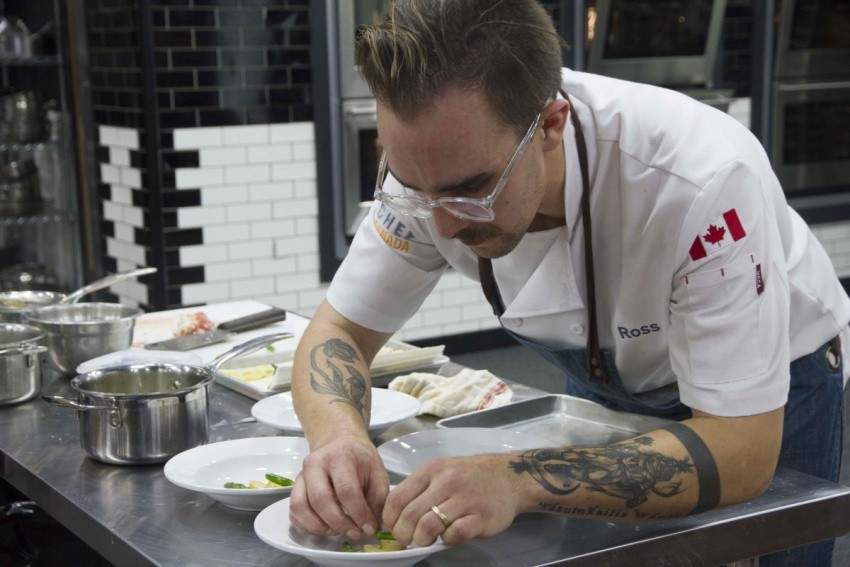
Ross is doing an ode to Newfoundland with ingredients that are only available by hunting and foraging (and were brought by Jeremy Charles). His amuse bouche is a selection of Newfoundland “snacks”, such as welk skewers, moose tartare and cod chitlins.
The judges feel that Mark did a better job of creating a single bite that told a whole story. One point for Mark.
For the second course, Ross makes a scallop in a dashi sauce with uni. It looks delicious.
Mark creates the taste of a burger but without using any of the components of a burgers, just its basic ingredients. He makes a beef tartare with tomato jam and a mustard sauce. It’s a high concept dish that explodes with flavour that Eden says she can’t handle.
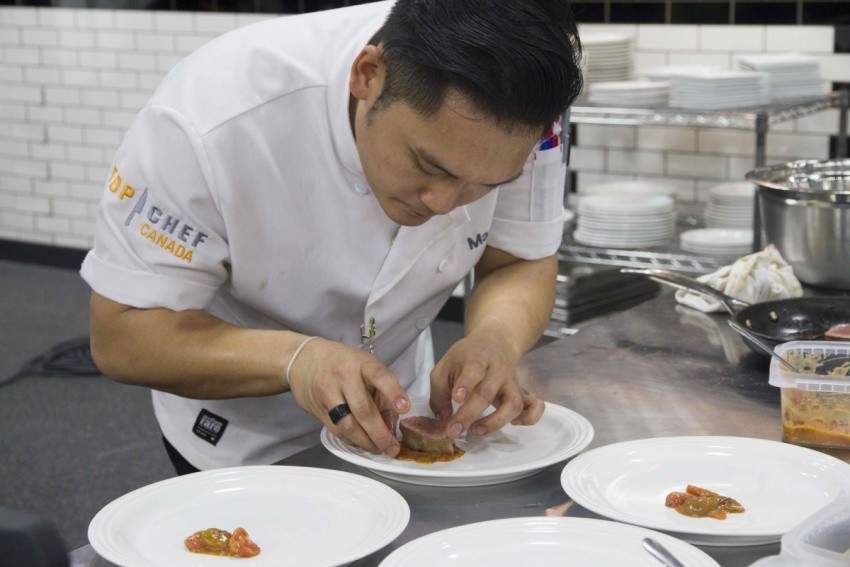
Chef Mark McEwan says that he is humbled by the food that is being served by both chefs. Ross made a fantastic dish, but Mark’s creativity and flavours takes this course. Another point for Mark.
The chefs both make fish for the third course. Mark serves a cured tuna with nori and white truffle (and other stuff that is very complicated). It’s good, but not great, say the judges. Ross makes a sea bass with onion confit and a sea urchin sauce. The judges say it is amazing and each ingredient sings. One point for Ross.
Finally, onto the main course and I’m both impressed and jealous of the judges’ ability to eat everything. Mark makes a riff on Chinatown-style BBQ duck and fried rice with duck, scallop, rice and a rose petal XO sauce. The love-in for Mark stops briefly as his duck is cold, tough and the sauce is salty.
Ross makes a partridge and wild hare dish with winter chanterelles. He serves the sauce in a flower native to Newfoundland. The dish is “spectacular”, according to Janet Zuccarini and it transports her to Newfoundland. Another point for Ross.
Now, onto desserts, which have mostly been disappointing failures this whole season.
We know from past episodes that Ross is not a fan of overly-sweet desserts and if anyone is going to make a dessert with a vegetable I assume it is going to be Ross. He scoops out the flesh of a parsnip and fries the skin. It looks like a shard of pastry sitting on top of a bed of parsnip cream with creeping snowberries on the side. And yes, those are native to Newfoundland too.
Mark is making the classic Filipino dessert halo-halo, which is traditionally made with shaved ice, condensed milk and fruit. Mark’s version has frozen iced tea, pandan sauce, coconut sorbet and jelly. It is a riot of vibrant colours and textures.
The judges decide that Ross’s dessert would not sell well by the description but is incredible tasting. They also love Mark’s version of halo-halo, which is not overly sweet and has some “magic” to it, according to Janet Zuccarini.
This one is a tie, with a possible edge to Mark.
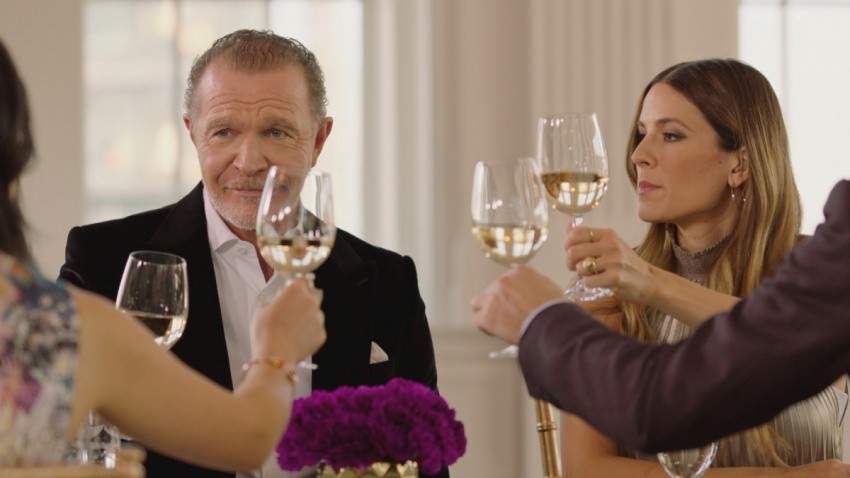
The judges are wowed by the meal, and the chefs who created it. The meals, and the chefs, are incredibly different. Mark Singson is a mad scientist who breaks down dishes to their elements and then builds them back up in surprising ways. He uses colour and Filipino history in his dishes.
Ross Larkin has incredible focus and has stuck to his Newfoundland flavours in each and every episode. His dishes are simple but with a complexity coming from great technique. The judges say that his cooking shows maturity and consistency.
When the judges ask the competitors about their favourite dish, Ross says his wild hare and partridge dish. The judges agree saying it was a 10 out of 10 dish. Mark says his duck and fried rice was his favourite dish. And I swear, I could feel the air go out of the room. The judges disagree but tell him he could build a career on the tartare and the halo-halo.
Despite their differences, both Mark and Ross share a passion for the food from where they come. Mark wants to change how people view Filipino food and open a Filipino restaurant. Ross is passionate about Newfoundland and the sense of place he brings to the table with the island’s ingredients.
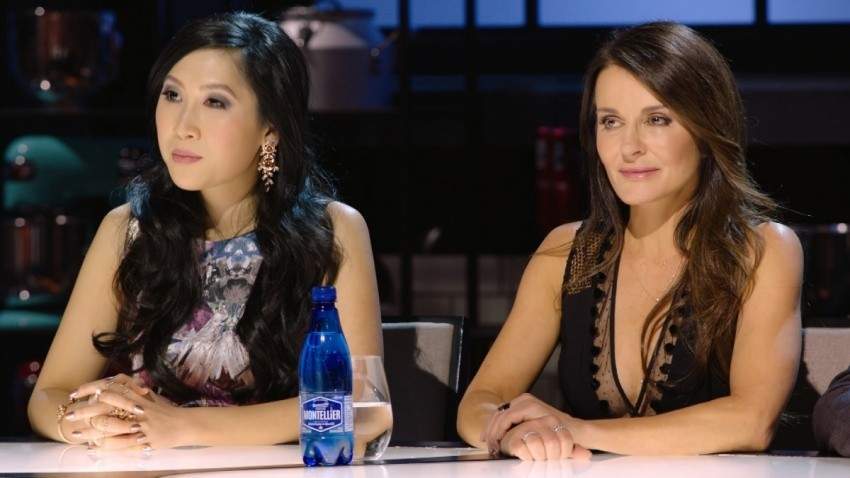
Chef McEwan seems weighed down by the difficulty of this decision. Mark’s highs were incredibly high, but were they high enough to make up for his misses? Mijune Pak reminds the judges that he cooked very well all season.
But Ross’s meal was more consistent. Chris Nuttall-Smith feels that it was the better meal.
So, who will win Top Chef Canada: Mark from the West Coast, who brings inventiveness and his Filipino roots to his dishes; or Ross, who has laser-sharp focus and the ability to make simple ingredients shine and whose food is consistent for the entire meal?
At this point, I want the judges to consider the whole season. Does one meal truly show who is the Top Chef? Or is it through a series of eight episodes?
If they consider the meal, plus the whole season, then Mark, who has consistently placed second in most challenges and cooked a meal with the highest of highs, would win. But if the focus is on one perfect meal, then it is Ross’s title for the taking.
Ross is Canada’s Top Chef.
Ross is speechless and doubled over with surprise. Mark is gracious and looks honestly happy with the outcome. He should be proud of what he has done, and I hope that he gets some of the Top Chef Canada bounce from being on the show. Mark says that this is a beginning for him, and I believe it is. I would love to eat a meal cooked by him.
Meanwhile, Ross recovers and is tearfully greeted by his wife and Jeremy Charles, who is carrying Champagne. Ross says that he is uncomfortable with the term chef, he never went to culinary school and yet, here he is. He is an excellent ambassador for the food from the Rock.
And so, the season ends, with the first Top Chef Canada winner from the East Coast. His food was pure and simple and showcases a part of Canada that we should all go visit. Book me into Raymonds; I want to try it for myself.
The truth is that I wish for a cleaner, better ending than this. Ross and Mark have worked hard, they are talented and passionate. (I’m going to throw Jinhee in there too, because I think she also deserved a chance at the finale.) Perception is everything, and the way that Ross won the title colours his win, and their losses. Would Ross have won if he didn’t have Atlantic lobster, Jeremy Charles and all those Newfoundland products? His focus and consistency may have taken him over the top, but we will never know that, and that’s not fair to him or to us. Ross has proven himself to be an upstanding person, I doubt he would want his win to be at all tainted.
But I’m not mad (or at least I’m not mad at Ross). The season had its highs and lows; and there was outstanding food, passionate chefs, and lots of caviar. Canada is filled with cooks, farmers, and eaters who want to highlight our amazing food and people; and that’s a good thing. Whether we are being pushed by chefs like Mark to new cuisines and new ways of doing things, or reminded by chefs like Ross about ignored and unsung parts of our country, we are lucky to be able to eat at this table.
Kitchen Scraps
Now we want to know if there will be another season. If there are more seasons, then we can have a Top Chef Canada: All-Stars with Matthew Sullivan, Mark Singson and Jinhe Lee. I would watch that, wouldn’t you?
It’s always interesting to see who gets the “bounce” out of the show. It’s not always the winner. I’m keeping my eye on Mark, Jinhee and Nathan. I don’t think we have seen the end of them yet.
If you want to hear some behind the scenes thoughts from Mark Singson and judge Mijune Pak, as well as interview with winner Ross Larkin, check out the More than Maple Syrup podcast. We have so much to say about Top Chef Canada, it will be a two-parter.

